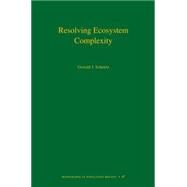Resolving Ecosystem Complexity
, by Schmitz, Oswald J.- ISBN: 9781400834174 | 1400834171
- Cover:
- Copyright: 7/21/2010
An ecosystem's complexity develops from the vast numbers of species interacting in ecological communities. The nature of these interactions, in turn, depends on environmental context. How do these components together influence an ecosystem's behavior as a whole? Can ecologists resolve an ecosystem's complexity in order to predict its response to disturbances?Resolving Ecosystem Complexitydevelops a framework for anticipating the ways environmental context determines the functioning of ecosystems.Oswald Schmitz addresses the critical questions of contemporary ecology: How should an ecosystem be conceptualized to blend its biotic and biophysical components? How should evolutionary ecological principles be used to derive an operational understanding of complex, adaptive ecosystems? How should the relationship between the functional biotic diversity of ecosystems and their properties be understood? Schmitz begins with the universal concept that ecosystems are comprised of species that consume resources and which are then resources for other consumers. From this, he deduces a fundamental rule or evolutionary ecological mechanism for explaining context dependency: individuals within a species trade off foraging gains against the risk of being consumed by predators. Through empirical examples, Schmitz illustrates how species use evolutionary ecological strategies to negotiate a predator-eat-predator world, and he suggests that the implications of species trade-offs are critical to making ecology a predictive science.Bridging the traditional divides between individuals, populations, and communities in ecology,Resolving Ecosystem Complexitybuilds a systematic foundation for thinking about natural systems.







